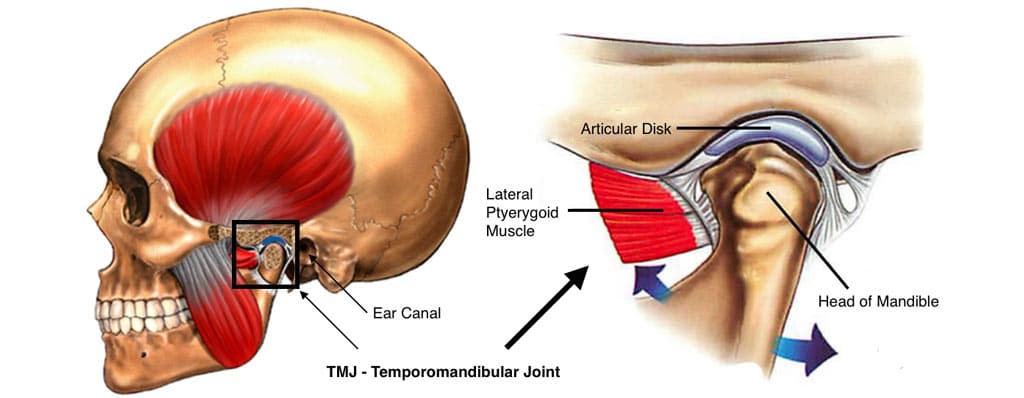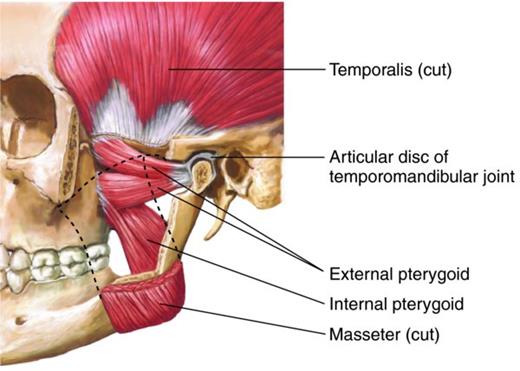How Are Jaw Disorders, Earaches And Headaches Related?
Jaw disorders (temporomandibular joint disorders or TMD) have become an increasingly common condition these days and are often in conjunction with headaches and neck pain.
In this article, we’ll cover the symptoms of jaw disorders, jaw-related ear and neck symptoms, contributing factors of jaw disorders, and how Physiotherapy can help overcome them.
What Is Temporomandibular Joint?
The temporomandibular joint (TMJ) or jaw joint connects your jawbone to your skull. In between the two bones that form the joint, sits an articular disc that acts like a cushion.

Muscles such as the temporalis, masseter, lateral, and medial pterygoids are involved in moving the TMJ joint. Movement of the TMJ allows you to open and close your mouth to eat, chew, speak, smile and yawn. It also allows you to move your jaw sideways, forwards and backwards.

What Causes TMD?
Traditionally, trauma to the jaw (direct blow or dislocation), misalignment of teeth (malocclusion) or missing teeth was thought to be the only cause of jaw disorders. Hence, dentists are usually regarded as the first point of contact in treating jaw disorders.
A dentist may treat jaw disorders by restoring jaw and teeth alignment, fixing ill-fitting dental fillings and making a splint or nightguard. Medication may also be prescribed to reduce pain, stress or anxiety levels.
More recent studies have demonstrated that TMD is caused by several factors which require expertise from other health professionals. These factors can lead to local dysfunction of the joints that result in pain:
- Poor posture
- Muscle imbalance
- Joint mobility
- Sub-optimal quality of movement in the jaw and neck
Your Emotional And Mental Wellbeing Plays A Part
Have you ever noticed yourself clenching your jaw when you’re feeling tense? Does your jaw feel worse during the weekdays compared to the weekends when you’re not working or on a holiday? In many cases, jaw disorders can be caused by stress, anxiety, depression and/or anger. Emotional or mental stress can manifest in physical symptoms.
For example, when a deadline is coming up or there is pressure to get things done, the emotional or mental stress you experience can result in a subconscious behaviour such as clenching of your jaw muscles. Overtime, this results in muscle tension and jaw pain.
Signs And Symptoms Of Jaw Disorders
The following are the most common signs and symptoms of TMD:
- Pain or tenderness around the cheek and jaw
- Pain or difficulty opening the mouth, chewing, yawning
- Noises and sensations (eg. clicking, clunking, grating, grinding, locking) of the jaw when opening or closing the mouth
- Waking up with a sore jaw and/or headache around the temples
- Being told by someone else that they were grinding their teeth while sleeping
Jaw-Related Ear And Neck Symptoms
Research has shown that it is common for people with TMD to experience symptoms in their ear and neck due to the proximity of the 3 anatomical structures (jaw, ear and neck). Related symptoms include:
- Ringing, hissing or buzzing of the ear
- Ear pain or ache
- Itchy ears or ear fullness
- Dizziness
- Headache around the forehead and/or temples, behind the eyes
- Pain behind or along the sides of the head
- Reduced mobility in the neck
- Sore and/or tight neck muscles
Easy Exercises For You
Let’s learn some useful jaw exercises that can help to alleviate your jaw aches.
Visit Your Physiotherapist
This is where we as physiotherapists can help you! Depending on our assessment, a mobility, stability and strengthening program that’s specific to you will be given to improve your symptoms. Education on the resting position of your jaw (teeth apart, tongue resting at the roof of mouth), relaxation and breathing techniques will also be taught.
As jaw disorders tend to be multifactorial, it is best managed with a multidisciplinary team. Depending on the cause and contributing factors of your symptoms, physiotherapists will work closely with other health professionals such as dentists, doctors, counsellors and clinical psychologists to help you achieve the best outcome possible.
Seeking a counsellor or clinical psychologist is important to help you identify healthy coping strategies and perhaps explore how your thoughts, feelings and behaviours are interconnected. When the causes of jaw disorders are addressed, the related ear and neck symptoms should be resolved as well.
Don’t Be Shy
Think you may have a jaw disorder or unsure what’s causing your jaw, ear or neck symptoms? Let your physiotherapist help you figure it out. Your therapist will conduct an in-depth assessment of the relationship between the jaw, ear and neck to find out what’s causing and contributing to your symptoms. A tailored treatment plan will then be explained to you and any questions you have will be addressed.
Written By: Emmanuelle Chow, B.Sc. (Hons) Physiotherapy (AUS), Clinical Pilates Instructor AHPRA (AUS)
Emmanuelle is an experienced Physiotherapist specialising in musculoskeletal conditions, specifically TMJ (Temporomandibular Jaw Disorder) and conditions of the neck, back, shoulders, and knees. She also specialises in chronic pain conditions and global hypermobility. Outside of her time in the clinic, you can find her pursuing her Master of Counselling Degree.

